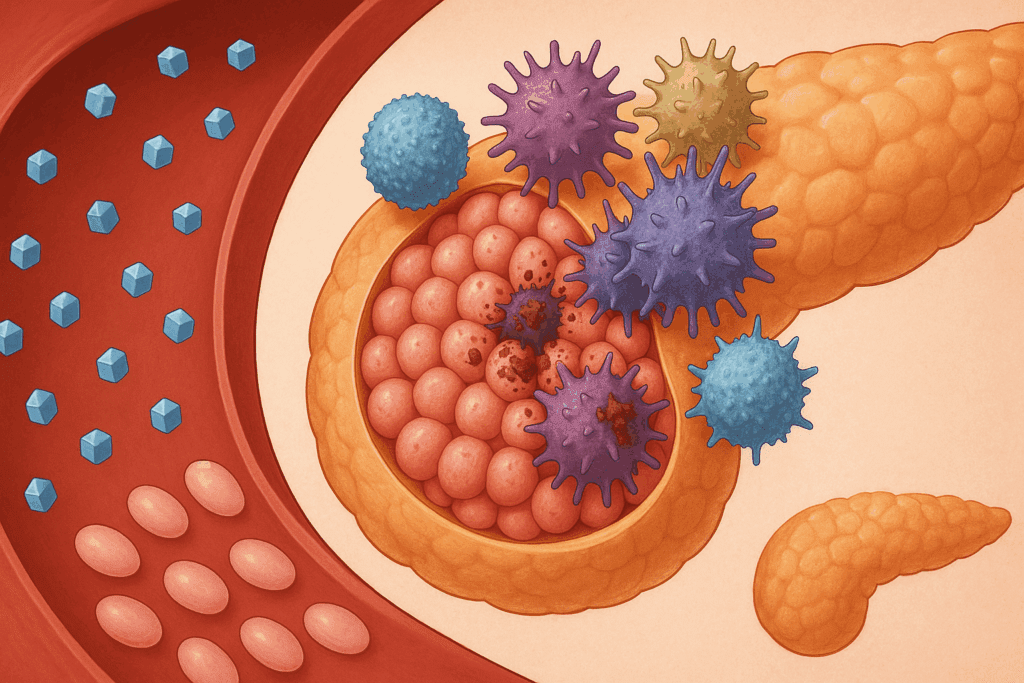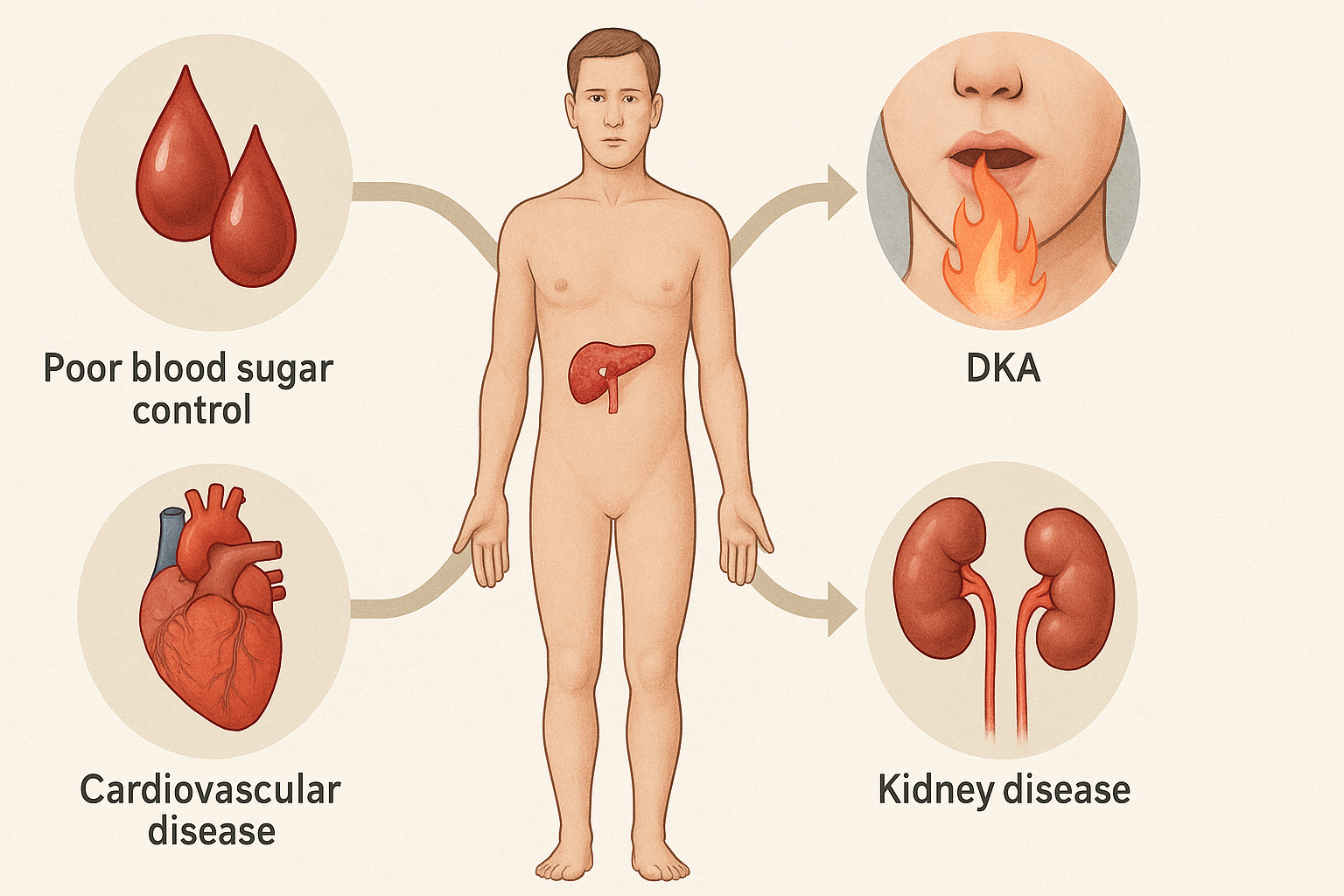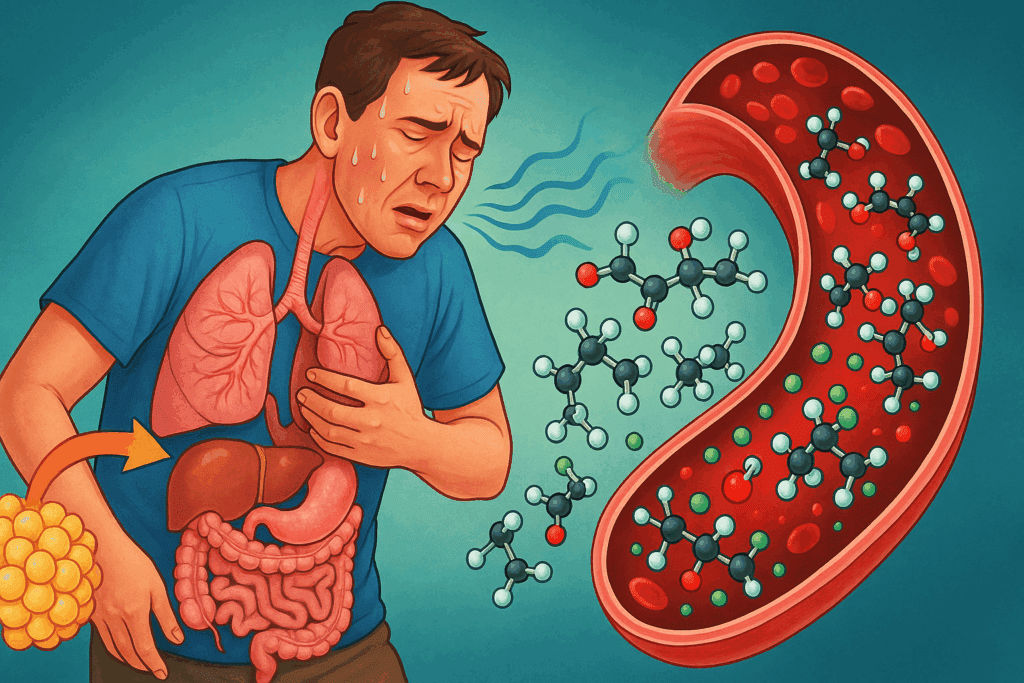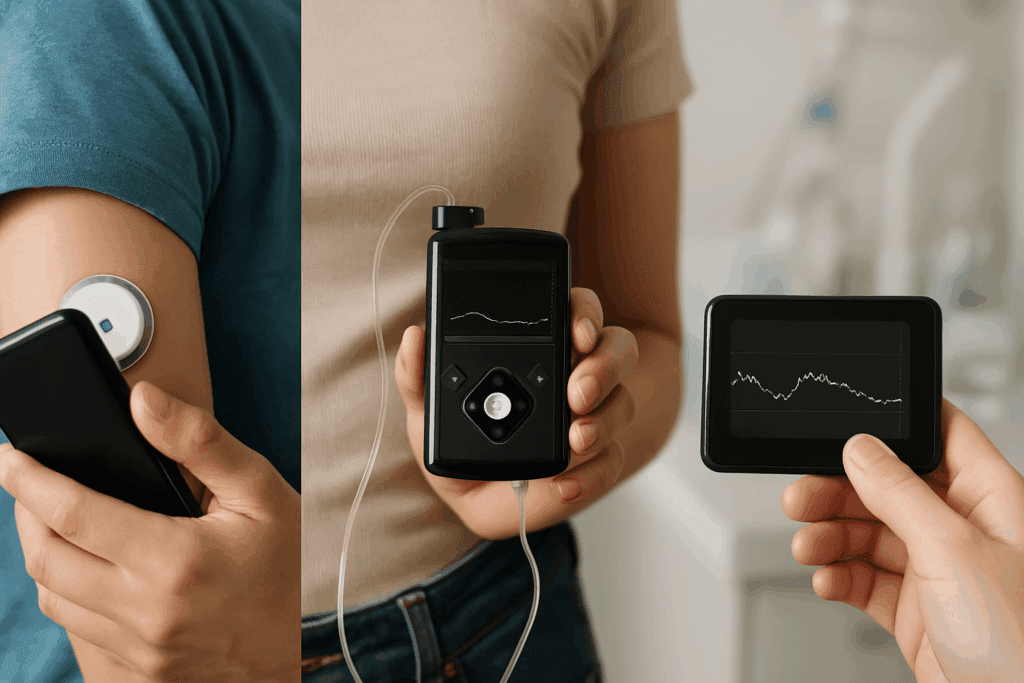Type 1 diabetes is a chronic condition that affects millions of people worldwide. While advances in medicine, technology, and lifestyle management have significantly improved the quality of life for those living with the disease, the question of its long-term risks remains a critical topic. Among the most concerning aspects of type 1 diabetes is the question of its impact on mortality: can you die from type 1 diabetes? Research continues to explore this issue, revealing important insights into the factors that influence the type 1 diabetes death rate. This article delves into the latest findings, examining the risks, survival factors, and ways in which individuals with type 1 diabetes can better manage their condition to reduce the risk of severe outcomes.
You may also like: Breakthroughs in Current Diabetes Research: What the Latest Studies Reveal About Treatment and Prevention

What Is Type 1 Diabetes?
Type 1 diabetes is an autoimmune condition in which the body’s immune system attacks and destroys the insulin-producing beta cells in the pancreas. As a result, individuals with type 1 diabetes are unable to produce their own insulin, a hormone that is critical for regulating blood sugar levels. Without insulin, the body cannot properly absorb glucose from the bloodstream, leading to high blood sugar levels. Managing blood sugar is crucial for preventing both short-term and long-term complications, including diabetic ketoacidosis, cardiovascular disease, and nerve damage.
The disease typically develops in childhood or adolescence, though it can also occur in adulthood. Unlike type 2 diabetes, which is more closely linked to lifestyle factors like diet and exercise, type 1 diabetes is not preventable and has no known cure. People with type 1 diabetes rely on external insulin sources, either through injections or an insulin pump, to manage their blood sugar levels.
The Link Between Type 1 Diabetes and Mortality
While significant advances in the treatment and management of type 1 diabetes have improved survival rates, the question remains: can you die from type 1 diabetes? Historically, people with type 1 diabetes faced a significantly higher risk of premature death compared to the general population. However, the death rate has decreased dramatically over the years as treatments have become more effective. Despite this, individuals with type 1 diabetes still face a heightened risk of certain life-threatening conditions.
The type 1 diabetes death rate can be influenced by various factors, including how well blood sugar levels are controlled, the presence of co-existing conditions, and lifestyle choices. Poorly controlled blood sugar levels can lead to complications such as diabetic ketoacidosis, heart disease, kidney failure, and nerve damage. Additionally, studies have shown that individuals with type 1 diabetes are more likely to develop cardiovascular disease, which is a leading cause of death in this population.

Factors That Influence the Type 1 Diabetes Death Rate
While it is possible to live a long and healthy life with type 1 diabetes, certain factors can influence the death rate associated with the condition. These factors include the following:
Blood Sugar Control
Effective blood sugar management is critical for reducing the risk of complications and premature death. People with type 1 diabetes who maintain tight control over their blood sugar levels are less likely to experience severe complications, including diabetic ketoacidosis and cardiovascular disease. Research has shown that the closer blood sugar levels are to normal, the lower the risk of long-term complications, which can significantly impact life expectancy.

Diabetic Ketoacidosis (DKA)
One of the most dangerous acute complications of type 1 diabetes is diabetic ketoacidosis (DKA), a condition that occurs when the body starts to break down fat for energy due to a lack of insulin. This process produces ketones, which can build up in the blood and lead to acidosis. If left untreated, DKA can result in coma and death. Although DKA is less common today due to better management of diabetes, it remains a leading cause of death among individuals with type 1 diabetes, particularly in young children and those who are newly diagnosed.
Cardiovascular Disease
People with type 1 diabetes are at a higher risk for cardiovascular disease, including heart attacks, strokes, and heart failure. Chronic high blood sugar can damage the blood vessels and nerves, increasing the likelihood of these complications. This is particularly true for individuals who have had type 1 diabetes for many years and have not maintained optimal blood sugar control. Cardiovascular disease is one of the leading causes of death for those with type 1 diabetes, and it underscores the importance of managing blood pressure, cholesterol levels, and other heart health factors.
Kidney Disease
Chronic kidney disease (CKD) is another complication that can arise from poorly managed type 1 diabetes. Over time, high blood sugar can damage the kidneys, leading to reduced kidney function. In severe cases, kidney failure can occur, requiring dialysis or a kidney transplant. The risk of kidney disease is higher for people with type 1 diabetes who have had the condition for an extended period, especially if their blood sugar levels have been poorly controlled.
Nerve Damage (Neuropathy)
Diabetic neuropathy, a form of nerve damage caused by prolonged high blood sugar, can lead to serious complications, including loss of sensation in the extremities, infections, and amputations. In severe cases, nerve damage can impact the autonomic nervous system, which controls essential bodily functions like heart rate, blood pressure, and digestion. Nerve damage can significantly impact quality of life and, in rare cases, lead to death if complications arise.

The Role of Technology and Advances in Diabetes Care
Recent advancements in diabetes care have had a profound impact on reducing the risks associated with type 1 diabetes. Technologies such as continuous glucose monitors (CGMs) and insulin pumps allow individuals to better track and control their blood sugar levels. CGMs provide real-time data on blood glucose levels, enabling users to make more informed decisions about their insulin dosing and lifestyle choices. Insulin pumps, which deliver a continuous supply of insulin, offer a more precise and flexible way to manage blood sugar levels, reducing the risk of both hypoglycemia and hyperglycemia.
Moreover, advancements in artificial pancreas systems, which combine CGMs and insulin pumps to automatically adjust insulin delivery based on blood sugar readings, have been shown to improve blood sugar control and reduce the risk of complications. These technologies represent a significant step forward in managing type 1 diabetes and offer hope for reducing the death rate associated with the condition.

Mental Health and Diabetes Management
While the physical aspects of managing type 1 diabetes are well-documented, mental health also plays a crucial role in the overall well-being of individuals with the condition. Diabetes distress, depression, and anxiety are common among people with type 1 diabetes and can negatively impact diabetes management. Poor mental health can lead to neglect of blood sugar control, resulting in higher risks of complications.
Recent studies have shown that individuals who experience high levels of stress or depression may be more likely to experience poor blood sugar control, increasing the risk of diabetic complications. Addressing mental health needs is therefore essential for improving the quality of life and reducing the risks associated with type 1 diabetes. Support from mental health professionals, along with a strong support network, can play a key role in helping individuals manage both the physical and emotional aspects of the disease.

How Can People with Type 1 Diabetes Improve Their Survival Odds?
The good news is that with proper management, people with type 1 diabetes can significantly reduce the risks associated with the disease and live a long, healthy life. The key to improving survival odds lies in a combination of careful blood sugar management, regular monitoring for complications, and a healthy lifestyle. Here are some steps individuals with type 1 diabetes can take to improve their health outcomes:
- Adopt a Healthy Diet
Eating a balanced, diabetes-friendly diet is crucial for managing blood sugar levels. A diet rich in whole grains, vegetables, lean proteins, and healthy fats can help stabilize blood sugar and reduce the risk of complications. Additionally, managing carbohydrate intake is essential for preventing spikes in blood sugar levels. - Engage in Regular Physical Activity
Exercise is one of the most effective ways to improve insulin sensitivity and manage blood sugar levels. Regular physical activity helps the body use insulin more efficiently, reducing the risk of both high and low blood sugar levels. A combination of aerobic exercises, strength training, and flexibility exercises is recommended for overall health. - Monitor Blood Sugar Levels Regularly
Frequent blood sugar monitoring is essential for preventing dangerous fluctuations in blood glucose. People with type 1 diabetes should work closely with their healthcare team to determine the best target range for their blood sugar and develop a plan to stay within that range. - Take Medications as Prescribed
Following prescribed insulin regimens and taking any additional medications as directed is vital for managing blood sugar levels and preventing complications. Insulin therapy, whether via injections or an insulin pump, should be tailored to each individual’s needs based on their lifestyle, eating habits, and activity level.
Frequently Asked Questions (FAQ) about Type 1 Diabetes and Its Impact on Life Expectancy
Can you die from type 1 diabetes?
While it is possible to die from type 1 diabetes, the overall risk has significantly decreased with advancements in medical care and technology. The main risk factors contributing to death in individuals with type 1 diabetes are complications like diabetic ketoacidosis (DKA), cardiovascular disease, kidney failure, and other long-term health issues caused by poorly controlled blood sugar levels. Early diagnosis, effective insulin therapy, and ongoing management of blood glucose can substantially reduce these risks, allowing individuals with type 1 diabetes to live long, healthy lives. With modern treatments, the death rate associated with type 1 diabetes is lower than ever before, but continuous vigilance is required to minimize the likelihood of severe complications.
What are the primary causes of death in individuals with type 1 diabetes?
The leading causes of death in individuals with type 1 diabetes are primarily linked to long-term complications. Cardiovascular disease, such as heart attacks and strokes, is a significant contributor to the type 1 diabetes death rate. Diabetic ketoacidosis, a severe condition arising from insufficient insulin, can also lead to death if not treated promptly. Chronic kidney disease, resulting from prolonged high blood sugar levels, can progress to kidney failure, further elevating mortality risks. Effective management of blood sugar levels through insulin therapy and lifestyle changes, such as a healthy diet and regular exercise, can help mitigate these risks.
Does the type 1 diabetes death rate vary by age group?
Yes, the type 1 diabetes death rate does vary significantly by age. Younger individuals with type 1 diabetes are less likely to die from the condition itself, as they typically have fewer long-term complications. However, the risk of death increases with age due to the cumulative effects of high blood sugar levels over time. Adults with long-standing type 1 diabetes face higher risks of cardiovascular disease, kidney complications, and other systemic health issues that can increase their mortality risk. This highlights the importance of early and consistent management of type 1 diabetes to reduce long-term risks.
How can individuals with type 1 diabetes reduce their risk of complications?
Reducing the risk of complications and the type 1 diabetes death rate involves consistent management of blood sugar levels. Regular blood sugar monitoring, proper insulin therapy, and adopting a diabetes-friendly diet are essential for controlling glucose levels. Maintaining an active lifestyle, including regular physical activity, can improve insulin sensitivity and help manage blood sugar more effectively. Additionally, controlling other risk factors such as high blood pressure and cholesterol levels can significantly reduce the likelihood of heart disease and stroke, two major contributors to the type 1 diabetes death rate.
Are there new technologies that can help prevent death from type 1 diabetes?
Yes, technological advancements have made a significant impact in reducing the risks associated with type 1 diabetes. Continuous glucose monitors (CGMs) provide real-time data on blood sugar levels, allowing for quicker adjustments to insulin doses and minimizing the risk of dangerous fluctuations. Insulin pumps, which deliver a steady supply of insulin, help maintain stable blood sugar levels throughout the day. Furthermore, the development of artificial pancreas systems, which automatically adjust insulin delivery based on glucose levels, has shown promise in improving control and reducing complications. These technologies are key in lowering the type 1 diabetes death rate by ensuring better overall blood sugar management.
What role does mental health play in the type 1 diabetes death rate?
Mental health is a crucial yet often overlooked factor in the management of type 1 diabetes. Conditions such as diabetes distress, anxiety, and depression are common among those with type 1 diabetes and can have a profound effect on self-management. Poor mental health can lead to neglect of blood sugar control, which in turn increases the risk of complications and contributes to the type 1 diabetes death rate. Addressing mental health needs through therapy, support groups, and stress management techniques is essential for improving both physical and emotional well-being, ultimately helping to lower the risks associated with the disease.
How does cardiovascular disease affect the type 1 diabetes death rate?
Cardiovascular disease is one of the leading contributors to the type 1 diabetes death rate. People with type 1 diabetes are at a higher risk of developing heart disease due to the long-term effects of elevated blood sugar levels, which can damage blood vessels and increase the likelihood of plaque buildup. Over time, this damage can lead to conditions such as heart attacks, strokes, and heart failure. By managing blood glucose levels, controlling cholesterol, and maintaining a healthy lifestyle, individuals with type 1 diabetes can reduce the impact of cardiovascular disease and lower their mortality risk.
Can a type 1 diabetes diagnosis lead to premature death?
While a type 1 diabetes diagnosis does not guarantee premature death, the type 1 diabetes death rate is higher among those who do not effectively manage their condition. The risk of early mortality can be significantly reduced by adhering to proper diabetes management practices, including blood glucose monitoring, insulin therapy, and regular checkups for complications such as kidney disease and eye health. With the right care, individuals with type 1 diabetes can live to a normal life expectancy. However, without diligent management, the risks of complications like diabetic ketoacidosis or heart disease increase, contributing to premature death.
What are the long-term implications of type 1 diabetes on life expectancy?
The long-term implications of type 1 diabetes on life expectancy largely depend on how well the condition is managed throughout a person’s life. Research indicates that individuals with well-controlled blood sugar levels and minimal complications can expect to live a lifespan close to that of the general population. However, individuals who experience frequent fluctuations in blood sugar or who develop complications like cardiovascular disease, kidney failure, or neuropathy may experience a reduced life expectancy. Regular checkups and proactive management are essential in preventing complications and improving life expectancy for those with type 1 diabetes.
Is there a cure for type 1 diabetes, and will this impact the type 1 diabetes death rate?
Currently, there is no cure for type 1 diabetes. However, ongoing research into potential cures, such as pancreatic islet cell transplants and the development of immunotherapies, shows promise. Advances in these areas could potentially reduce the type 1 diabetes death rate by addressing the root cause of the disease—autoimmune destruction of insulin-producing cells. In the meantime, improvements in diabetes management, including new insulin formulations, technologies like artificial pancreases, and more effective treatments for complications, continue to help people with type 1 diabetes live longer, healthier lives despite the absence of a cure.
Conclusion: Can You Die from Type 1 Diabetes?
The type 1 diabetes death rate, though significantly reduced over the years due to advancements in care and treatment, remains a critical concern. While it is possible to die from type 1 diabetes, particularly due to complications such as diabetic ketoacidosis, cardiovascular disease, or kidney failure, proper management of the condition can greatly improve life expectancy. By maintaining good blood sugar control, adopting a healthy lifestyle, addressing mental health needs, and staying informed about the latest technologies, individuals with type 1 diabetes can greatly reduce their risks and live long, fulfilling lives. The key to survival lies in proactive, informed management of the condition, which can dramatically lower the risk of mortality.
Further Reading:
Dead in bed – A systematic review of overnight deaths in type 1 diabetes
Adult-Onset Type 1 Diabetes: Current Understanding and Challenges
What Is the Life Expectancy for Type 1 Diabetes?
Disclaimer
The information contained in this article is provided for general informational purposes only and is not intended to serve as medical, legal, or professional advice. While MedNewsPedia strives to present accurate, up-to-date, and reliable content, no warranty or guarantee, expressed or implied, is made regarding the completeness, accuracy, or adequacy of the information provided. Readers are strongly advised to seek the guidance of a qualified healthcare provider or other relevant professionals before acting on any information contained in this article. MedNewsPedia, its authors, editors, and contributors expressly disclaim any liability for any damages, losses, or consequences arising directly or indirectly from the use, interpretation, or reliance on any information presented herein. The views and opinions expressed in this article are those of the author(s) and do not necessarily reflect the official policies or positions of MedNewsPedia.


